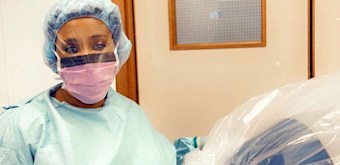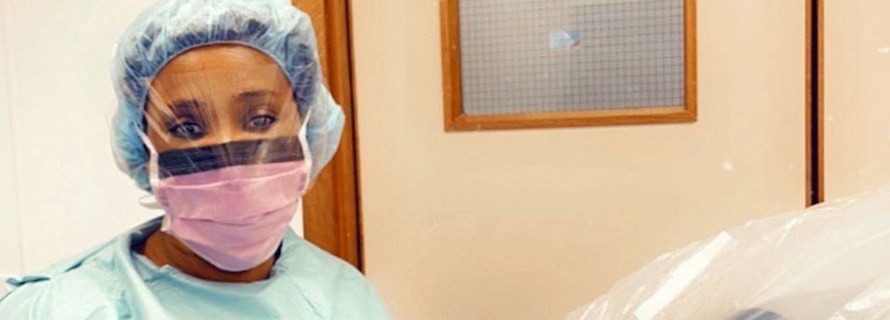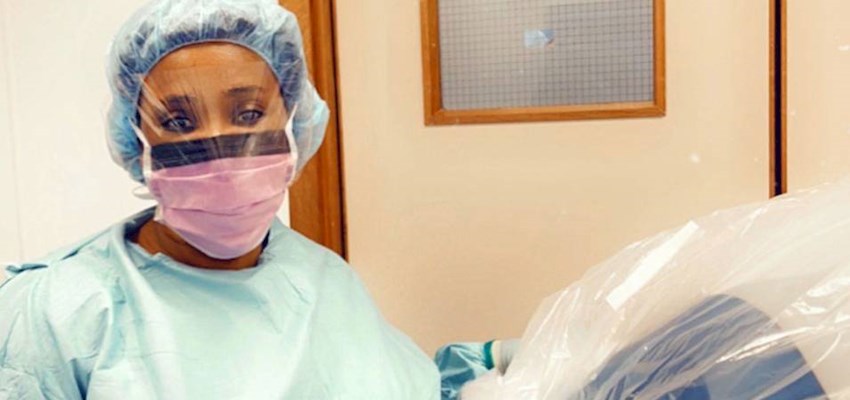How a trip to New Zealand inspired an orthopaedic career
We know orthopaedic treatment doesn't begin or end with surgery. Our orthopaedic teams, of which our nurse specialists are a vital part, are integral to improving patient outcomes, reducing risks and encouraging patients with their recovery. The team can make the most complex surgical procedures appear routine.
Naome Mukanganise works in orthopaedics as the Theatre Coordinator and Orthopaedic Team Leader at HCA UK’s The Princess Grace Hospital. Towards the start of her career, Naome experienced different specialties but didn't know what field to specialise in.
"I rotated through breast surgery and general surgery; but when I travelled to New Zealand, I was inspired by a nurse in orthopaedics. She was so passionate. I could see her satisfaction after surgery, and I loved seeing that success. I thought to myself, if she can do it, why can't I? I never turned back."




What does specialising in orthopaedics involve?
Common orthopaedic surgery tends to be dominated by hip and knee joint replacements. Naome, though, also deals with unplanned procedures, such as emergency fractures. For the emergencies there’s a significant time pressure; the theatre slots need to be immediately allocated and surgery planned.
Orthopaedic theatre nurses work alongside surgeons and different members of the multidisciplinary team (MDT) to prepare for surgery. The attention to detail and dedication the nursing team brings is truly appreciated by both surgeons and the patients. Before surgery, surgeons and consultants lead a detailed brief and the team discuss the checklist for the procedure, which includes the required equipment, the patient's allergy status and if a replacement surgery, whether the selected implant is ready.
"Orthopaedics is demanding, you can't do orthopaedic surgery with one tray of equipment. You've got a lot to prepare. I've developed such a good relationship with my orthopaedic surgeons. They will send me direct emails to say, 'Naome, I've got a case coming up. Please make sure that we are ready for this type of surgery.' I’m always making sure the process runs well."
Working in an operating theatre
Naome also works alongside consultant secretaries in case there are further details to clarify. "There's always something new every single day. You experience continuous learning in orthopaedics."
Before surgery starts, Naome ensures all the risk assessments are complete. She also prepares the operating theatre, making sure it is clean and contains the correct equipment.
"Being in an operating theatre can be the scariest experience for a patient," says Naome, so she and the orthopaedic team develop a relationship with the patient if they are awake before surgery, though most of the time the patient enters under anaesthetic. During the COVID-19 pandemic, the team had to anaesthetise the patient in theatre, so Naome and the team spent more time with them.
At the end of the procedure, the team discusses how the surgery went. "Post-surgery meetings are very informative. There is an opportunity to understand what the consultants feel because they don't always have that opportunity during surgery," says Naome. "We want to understand what could run smoother or follow a different path. For example, surgery is forever changing. The practice is forever changing. There is more and more data being generated, inspiring new techniques. You get to hear and learn a lot when you sit down with experienced colleagues."
Although the patient relationship can sometimes be brief, Naome follows up with consultants to ask how patients are recovering. Although she doesn’t get to see the patients at follow up appointments, she likes to find out what happened. "We understand the patient transformation and their progress, from the operating theatre to the outpatient recovery. One consultant even shares videos of patients’ recovery post-surgery. Often orthopaedic patients come to HCA UK struggling to walk, you see them in the operating theatre and then later you hear about them walking or exercising. It is amazing."
Sharing knowledge
Sometimes, surgery can be challenging. "It’s difficult when you don't know whether an operation is going to be a success, for example, if the patient will have to return for further procedures." One patient case resonates strongly with Naome: "Their femur bone had completely gone and required a custom-made implant. I'm thinking ‘if this patient doesn’t have a bone to work with, how is this going to be achieved?’ The femoral prosthetic was connected to the pelvis and anchored below and the surgery was a success."
These remarkable stories continue to inspire Naome, and she continues to pass on her knowledge. Naome loves teaching. "It’s so rewarding to give away that knowledge to someone else,” she says. For anyone who wants to be an orthopaedic nurse, Naome believes you can do it. “I would say challenge yourself; it is doable. There is a huge satisfaction in seeing a patient's recovery."
Meeting such strong, enthusiastic characters early in her career shaped Naome’s vision and dedication for orthopaedics at HCA UK. "Even at home, my husband knows my job touches my heart."